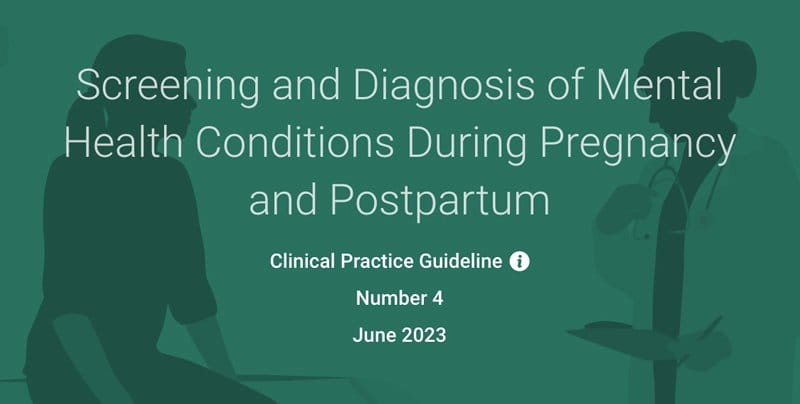Our work covering federal agency activities is made possible through capacity grant from the Perigee Fund.
The recent report from the Agency for Healthcare Research and Quality (AHRQ), “Nonpharmacologic Treatments for Maternal Mental Health Conditions,” reveals the results of the agency’s systematic review of randomized controlled trials (RCTs) to identify the effectiveness of non-drug treatments for treating maternal mental health disorders including depressive disorders, anxiety disorders, bipolar disorder, post-traumatic stress disorder (PTSD), and obsessive-compulsive disorder (OCD).
Here’s a summary of the key findings and their implications for maternal mental health.
Key Findings from the AHRQ Report
Cognitive Behavioral Therapy (CBT):
Effectiveness: CBT stands out as a highly effective nonpharmacologic treatment for perinatal depressive disorders. The report indicates that CBT is more effective than treatment as usual (TAU) in reducing both depressive and anxiety symptoms, with a moderate strength of evidence (SoE). Additionally, CBT may increase remission rates for depressive symptoms (low SoE).
Implications: Given its effectiveness, integrating CBT into standard care practices for perinatal individuals could significantly improve mental health outcomes.
Interpersonal Therapy (IPT):
Effectiveness: IPT is another robust option, showing moderate SoE in reducing depressive symptoms and low SoE in alleviating anxiety symptoms compared to TAU. IPT may also help increase remission rates for depressive symptoms (low SoE).
Implications: Incorporating IPT into maternal mental health programs can provide additional support for those experiencing depression and anxiety during the perinatal period.
Behavioral Activation:
Effectiveness: This CBT technique, though supported by low SoE, is more effective than TAU in reducing depressive symptoms.
Implications: Behavioral activation can be a valuable addition to maternal mental health strategies, particularly for those who might benefit from more structured and engaging activities.
Exercise Interventions:
Effectiveness: Regular exercise has been shown to be more effective than TAU in reducing depressive symptoms, with moderate SoE.
Implications: Encouraging physical activity as part of perinatal care can have significant mental health benefits, making it a simple yet powerful tool for improving maternal well-being.
Acupuncture:
Effectiveness: Specific acupuncture techniques may increase remission rates for depressive symptoms compared to nonspecific or sham acupuncture (low SoE).
Implications: While more research is needed, acupuncture could be considered a complementary treatment for perinatal depression.
Insufficient Evidence for Other Conditions in the Perinatal Population
The report highlights that there is insufficient evidence to draw conclusions about the effectiveness of nonpharmacologic treatments for:
- Anxiety disorders
- Combined depressive and anxiety disorders (though CBT may help)
- Post-traumatic stress disorder (PTSD)
- Obsessive-compulsive disorder (OCD)
- Bipolar disorder
Additionally, AHRQ notes there is a lack of evidence comparing nonpharmacologic treatments to pharmacologic treatments for these conditions. The potential harms and adherence to nonpharmacologic treatments also require further investigation.
The AHRQ report underscores the promise of nonpharmacologic treatments, particularly CBT and IPT, for improving maternal mental health. These treatments offer effective alternatives to traditional pharmacologic approaches, providing options for those who may prefer or require non-drug interventions.
However, the report also identifies significant gaps in the research, particularly for conditions like anxiety disorders, PTSD, OCD, and bipolar disorder, noting future studies should focus on these lesser-examined areas to provide a more comprehensive understanding of how nonpharmacologic treatments can be best utilized.
It’s important to note that unlike recommendations from the U.S. Preventive Services Task Force, there is no requirement that insurers cover these services. However these therapies and services are typically covered by behavioral health insurers.
The Policy Center will continue to track and report future updates to these recommendations and similar recommendations.



